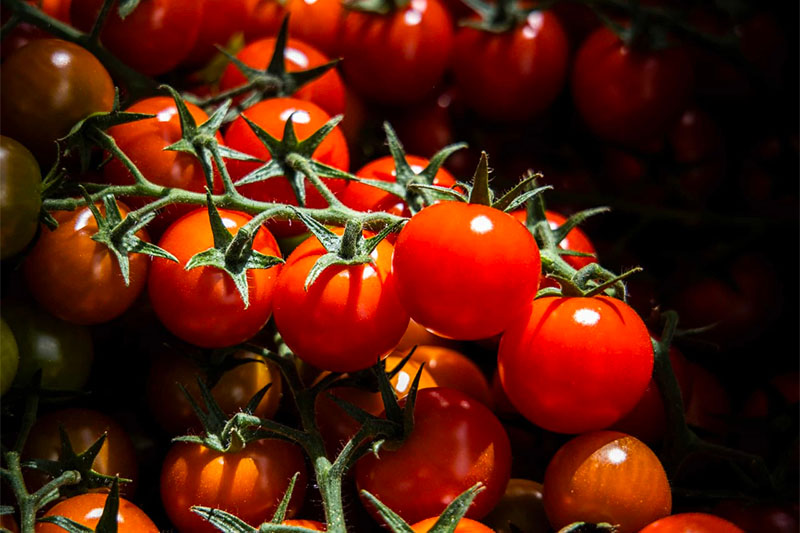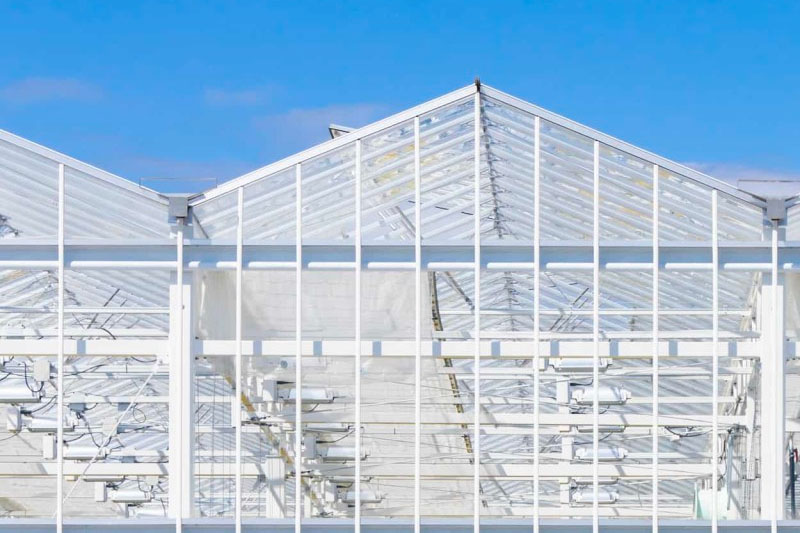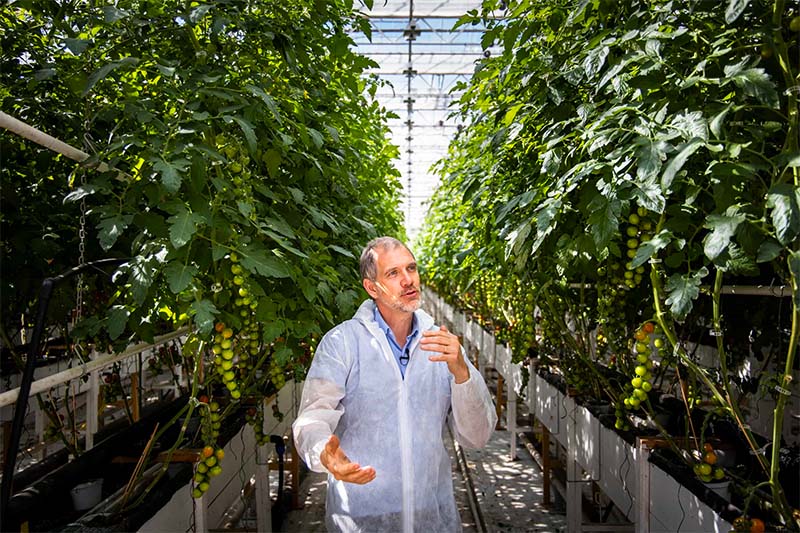A closed-loop system where tomatoes and rainbow trout support each other – and are the solution for both food shortages and environmental pollution. It sounds like science fiction but here in the High Coast, it is reality. And now, Peckas Naturodlingar in Härnösand is preparing to sell their concept on the global market.
“This is the food of the future”
The enormous greenhouse on the outskirts of Härnösand is surrounded by plastic manufacturers, car yards and furniture stores. The long rows of tomato plants suggest that this is just another large-scale plant nursery, but something entirely unique is happening here.
The idea came about in the 1990s when fish farmer Per Erik “Pecka” Nygård saw the environmental problems his conventional fish farm was causing in the sea. Food waste and fish excrement were contributing to the over fertilisation of the Baltic and consequently a decline in the water environment. So he asked himself: Would it be possible to use all this nourishment for something?
The solution was to move the fish farm on to land and lead the rich wastewater to a hydroponic plant nursery. In the nursery, tomato plants absorbed the nourishment in the wastewater and then the water was filtered before being led back to the fish – for the process to start all over again. The only thing that is added is organic fish food, oxygen and a small amount of new water.
“Pecka” tested his system for many years before deciding it was time to take the next step in 2013. Entrepreneurs Daniel Brännström and Hugo Wikström jumped at the idea and in 2015 the company Peckas Naturodlingar AB was founded. With his investors behind him, Pecka built a large plant in Härnösand and began the next stage.
“I felt that this was too good of an idea to ignore,” says Brännström.
Pecka is still active in the company, and his hand-drawn, schematic diagrams of the closed-loop system from 1996 are among the first things that Brännström shows visitors to the plant. The environmental advantages of the closed-loop system are many. All the nourishment in the system is used, nothing is released back into nature. And reduced water use per tomato is another big win.
“Even with specifically aimed watering of tomato plants, a lot of water is wasted around the plants. On average around the world, it usually takes about 200 litres of water to grow one kilo of tomatoes. We use about five percent of that – ten litres,” says Brännström.
Their tomatoes also need less nourishment than conventionally grown tomatoes – so much less that other growers can be worried about “starvation food”, says Brännström. But it works. The tomatoes are just as red and delicious as all the other tomatoes.
“Closed-loop systems are special, something happens that can’t really be explained.”
Pecka’s concept is environmentally friendly in so many ways: Nothing is discharged into the sea, and it uses very little water and added nutrition. Today, organic fish food from a Danish producer is used, but through his producer organisation, Peckas is researching a new, sustainable alternative.

“Insects, yeast protein and bacteria biomass are some of the new raw materials that are in the test food in small quantities.”
Tomatoes make up the main part of the company’s production and sales, and they make up about 90 percent of the company’s income. Before entering the tomato nursery, all visitors have to go through a lock where hands and shoes are disinfected. In addition to the normal routines in place for food safety, these measure are in place to protect the nursery from a tomato virus that can be found in several places in Europe. If the virus should make its way into the nursery, Pecka would be forced to start again from scratch.
Outside the secure nursery, there is a lot of activity. One of the directors is welcoming international guests. Interest in the concept is impressive and each week the company is contacted by hungry entrepreneurs who want to get going with the concept right away. So far interest has been mainly from Scandinavia and other parts of Europe, but even from further afield.
Brännström and Peckas Naturodlingar AB have been waiting for the right time. They want to be able to show a complete, large-scale operation – and the time is almost here.

Further in, contractors are working on an extension to the fish farm. The company employees, about 30 people, are busy taking care of all the different jobs around the place. Many of his workers came to Sweden as refugees in 2015.
“In countries such as Syria, people still have good knowledge and experience of how to grow vegetables. Our production leader Marwan Samaan comes from a family that had 2000 tomato plants in Syria. When he started here, it wasn’t the first time he had looked after a tomato plant, you could say!”
Brännström disappears into one of the offices and is gone for a minute. Some urgent issue has arisen and needs his attention. When he comes back, he is on a kick bike, which gives the real feel of a start-up company. And that is exactly what Peckas is today. After the initial big investments made for the greenhouse and technology, the company is working on fine-tuning the system and now with the help of artificial intelligence, they are optimising the growth of both their tomatoes and fish. The goal is to be able to sell a complete, well-functioning concept with both the hardware and software being part of the deal, including computer systems that will simplify cultivation and make it possible to provide support for the system remotely. Recently, the company opened its own fish hatchery as well so it is self sufficient for juvenile fish.
“Now that we have completed our closed-loop system with the fish hatchery, fish farm and the green house, we have a system that is ready for the market. We are currently in discussions with a number of interested parties and I am optimistic that sales will be made. We genuinely believe that this is the food of the future,” says Brännström.



